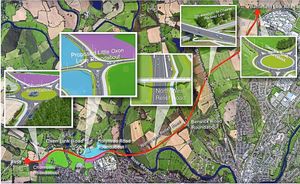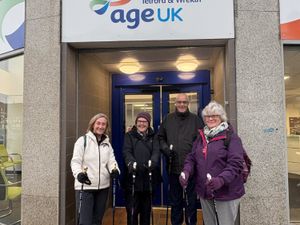Call to end 'car-centric transport planning' over Shrewsbury North West Relief Road
An alliance has been formed calling for a rethink over Shrewsbury's planned North West Relief Road.

Shropshire Wildlife Trust has joined Better Shrewsbury Transport (BeST), a group of organisations which holds the view that building more roads is neither sensible nor sustainable in a period of climate emergency.
The trust and many of its members believe that the construction of the road would have a highly detrimental effect on the local environment and also has serious concerns that it could endanger Shrewsbury’s water supply and cost a huge amount of money.
Robin Mager, the trust's planning officer said: “Against a backdrop of heightened awareness of climate change and the need to adopt creative ways to reduce carbon emissions, it is dispiriting that Shropshire Council continues to support projects that will encourage more traffic onto the roads.
“It is time to end car-centric transport planning and move towards investment decisions that reflect the true cost of car use to society."
The trust added that the Welsh government’s recent decision to drop the Gwent Levels M4 ‘relief’ road demonstrates that decision-makers are at last starting to realise that more road building is not the answer to dealing with congested traffic.
"The road was not only deemed environmentally destructive but also economically imprudent," it said.
The trust is concerned that the road would 'carve up' the existing countryside north of Shrewsbury, passing just half a kilometre from four local wildlife sites, including an ancient woodland and an internationally recognised wetland.
'Intrusion'
They added that Hencott Pool, with its rich flora of fen plants, is part of the unique meres and mosses landscape, its value recognised in a string of designations designed to protect it.
The trust also believes that bats, toads, newts, hares, hedgehogs, otters, kingfishers, skylarks and other wild birds and animals would be adversely affected by 'this intrusion into the landscape'.
They are particularly concerned after Shropshire Council recently recognised the climate emergency.
"Constructing this road would result in increased carbon emissions," they said in their report. "Within months of Shrewsbury’s Big Town Plan celebrating this very green wedge of countryside, the road proposal threatens to bisect and urbanise it."
Both the Environment Agency and Severn Trent Water have voiced their concerns regarding the scheme. These include the contamination of the ground water aquifer and the source protection zone that the Oxon Link Road will pass through. In the past it has been claimed that contamination could affect Shrewsbury’s drinking water as well as polluting pools and running water.
It has been forecast that the construction of the road will cost in the region of £71 million and there are fears that this could escalate with time.
The trust thinks that cost-effective solutions should be examined to deal with traffic and transport needs within the town and this 'simply has not been done'.
BeST has organised a public meeting on October 17 at 7.30pm at The Guildhall, Frankwell.
Shropshire Council said: “The environmental impact of the north west relief road was considered and fully explained as part of the published outline business case, with the impact balanced against the considerable positive environmental outcomes in terms of air quality, traffic levels, road safety, and increases in forecast walking/cycling activity and public transport use within the town itself.
"Plans to take in ongoing management of the Hencote Pool RAMSAR site alongside the road’s proposed route, to ensure the proper ongoing management of this key environmentally-sensitive habitat, are also included in the business case.
“Shropshire Council is committed to delivering bio-diversity improvements as part of a comprehensive package of measures to mitigate the environmental impacts of the road. Since the funding announcement, the council has been working closely with the Environment Agency and Severn Trent to address their early concerns regarding the road.
"The council will continue to work with stakeholders and undertake further public consultation before submitting the planning application in spring of next year.
“In advance of the Business Case’s submission to the DfT in December 2017, Shropshire Council undertook extensive public and stakeholder consultation including a number of very well attended events.
"The environmental case was a key aspect of this consultation, and Friends of the Earth were invited, and attended, all of these events alongside the council to fully set out their own position.”





